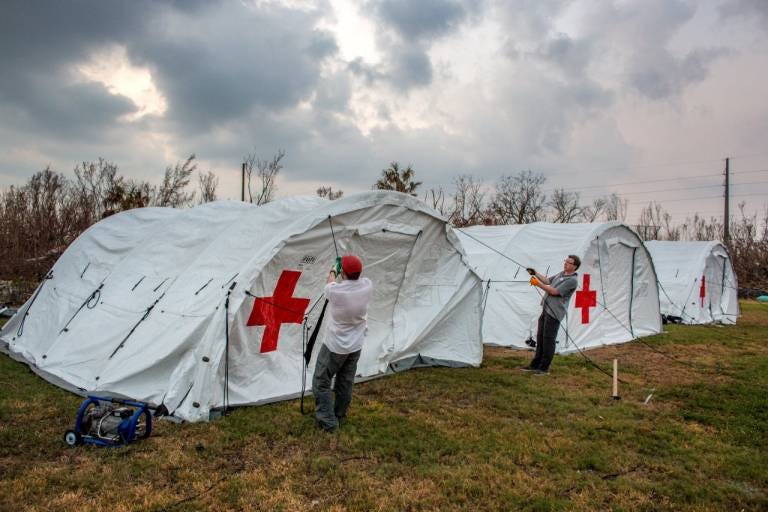(took the time to add in a bunch of reference links to this one because I want to make sure that this piece has a chance to boost your media literacy and let you check original evidence yourself. Keep reading, and by the conclusion you will have a helpful lens to view all of your newsfeeds and hopefully come to better, more informed conclusions for yourself)
***
If you're anything like me, you're experiencing recurring bouts of disaster fatigue and information overwhelm these days.
It's not going away anytime soon, and will likely get worse as conditions do.
(to say nothing of upcoming election-fueled pissing matches and AI turbo-charged misinformation campaigns on the horizon).
One minute you're watching David Attenborough or scanning your newsfeed of hurricanes and fires and concluding we're truly deeply screwed. Or how floods in Libya and Pakistan are displacing millions, or ice caps are melting at an alarming clip.
The next minute you're reading posts mocking climate alarm as a giant Davos Psy-Op, painting Greta Thunberg as a puppet for "Big Green."
Or hearing presidential candidates like Vivek Ramaswamy confidently declare "Human flourishing requires fossil fuels."
Or reading gleeful breakdowns of how Teslas harm the environment more than Humvees.
Or discovering how offshore windfarms are killing seabirds and whales (they're not).
It's understandable if we gave up in frustration right then and there.
But you're sincere about your media literacy and responsibility to be an informed citizen.
So you keep going, until you eventually come to a third chunk of news items.
They're a good bit more ambivalent: folks like Bjorn Lomborg (the "skeptical environmentalist," Vaclav Smil (the "crusty carbon" analyst), Nate Hagens (the "energy blind" professor) or Tom Murphy (the “Do the Math” physicist), and others who are punching holes in the Tesla/Solar booster crowd.
(note that Lomborg, who is frequently cited by cynical pro-oil accounts, cherry picks facts and makes rhetorically "good faith" arguments that are consistently bent in one direction)
But in general, this lot’s offering up facts that seem almost indistinguishable from the conservative naysayers and skeptics. Namely, that we are well and truly hooked on oil, and going Cold Turkey's gonna be an unholy sumbitch.
At which point, we all might say:
"I don't know whether to be terrified or relieved. But knowing anything for certain in this day and age is impossible! I'm gonna tune most of it out, live my best life, and leave the bickering to the experts. They'll figure it out if it's so important."
Which would be a tragic mistake, and exactly what "They" want us to think.
***
I recently had a clear hit of this dilemma talking with a close friend.
He's a well known environmental activist who spent over a decade leading campaigns for ocean cleanups, producing nature documentaries and speaking at UN conferences.
Doing his best to make a positive dent.
But as we were waiting in line to catch Dave Chappelle (good that night, but not great), my buddy started sharing his more recent thinking. It broke down into three key arguments:
"I'm not sure catastrophic human-caused climate change is a thing anymore. It's way too complex to know for sure, there's too many outlying bits of unresolved data. Overreacting could make things worse, not better."
"plus, even if we are actually responsible, then how could we fix it with the very same economics, technology and political systems that messed it up–we'd just be perpetuating the problem from our own blindness and arrogance."
"so, the only thing I've concluded is that we have to shift our consciousness and focus on abundance, gratitude and love, and raising our families as deliberately as we can."
Which I found fascinating.
Because we'd arrived at a similar ultimate conclusion–be grateful every day and love the ones we're with–from wildly different logic.
For him, it came down to:
Argument #1 Complexity and Ambiguity "more research needed"
Argument #2 Original Sin and Hubris "we're too fatally flawed to fix our own mess"
Argument #3 Change Comes from Within "turn inside because the outside seems unsolvable"
It was clear to me that he'd been meme-jacked.
And the tell tale signs weren't his arguments or the evidence. It was in his conclusions.
Because they all ended up in skeptical inaction and withdrawal.
The exact opposite of how he'd dedicated his past decade to inspiring change.
That did not happen by accident.
It’s how all propaganda campaigns, all the way back to Edward Bernays in the 1920’s to Soviet misinfo in the Cold War roll out–the goal isn’t to replace the truth with a lie. The goal is to muddy the notion of knowable truth so thoroughly that people give up ever finding it. (a much lighter lift and just as effective)
And it had the sticky fingerprints of Exxon and the Koch brothers all over it.
(in my friend’s case, it was likely smuggled in via the Conspirituality Anti-vax/Great Reset channels that so thoroughly infested Austin these past few years. Once Great Lockdowns failed to materialize and governments were all too happy to turn their citizens loose again, the Telegram Channel doom-mongers smoothly pivoted. Without skipping a beat, they sprayed over their anti-vax protest signs and updated them with the new Green Fascism arguments).
It won't be vaccine cards masquerading as Stars of David after all. It'll be your carbon social credit score!!!
***
Over the past four decades, the Exxon/Koch thinktanks have perfected the dark arts of obfuscation, delay, and whataboutism. And they've sown it far and wide via multi-billion dollar astro-turf influence campaigns.
(see Harvard historian Naomi Oreskes Merchants of Doubt for a thorough breakdown on this strategy )
Or the other, other Naomi (Klein) and her newly released Doppleganger: A Trip into the Mirror World that outlines the ludicrous turn of current paranoia.
So let's diagnose how my buddy, (and most of us if we're honest), are getting meme-jacked.
It's helpful to break down the most prominent memes into three different categories that show up across the political spectrum. (and figure out which ones to ignore, and which to really pay attention to)
False Hope
Fatalistic Doubt
Constructive Doubt
The first are the False Hopes of techno-capitalist optimists. They show up on the progressive left as well as on the conservative right.
Because interestingly, you get techno-utopianism on both sides of the political spectrum.
On the old school conservative, pro-business side, you have the Kuznet's Curve Argument–namely that we are making more with less and less, our technologies are forever improving in efficiencies, and the way forward is forward, faster, with fewer regulations to slow down the miraculous power of the free market.
(see this recent WSJ piece with a Houston chemical company executive making a strong version of exactly this case)
(Kuznet, you'll remember, is the Nobel prize winning economist who famously observed that the most advanced societies polluted the least because they had the combination of political will and technological sophistication to clean up their acts. It's those greedy, polluting Chinese and Indians we've got to keep an eye on, though).
On the Silicon Valley/X-Prize side of the divide, you have folks cheerleading for a Tesla in every driveway, a Powerwall in every pot, and an AI Roomba cleaning our smarthomes (while tutoring our children).
For them, the emphasis is less on free-market fundamentalism (though there's more than a few dog-eared copies of Atlas Shrugged floating around the Bay) and more on their utter faith in themselves.
Asperger tech-bros who've never seen a segment of culture they don't feel entitled to disrupt, convinced that Metcalfe's Law will never abandon them on their crusade to the stars.
But whichever word they emphasize, the Capitalist part, or the Techno part, both of these camps are subscribing to a blind faith-verging-on-religion in the Friedman-Musk Doctrine to deliver us from evil.
So check which bits of your information diet fall into that camp?
Then notice how you feel hearing their soothing assurances that Progress will keep progressing and the only thing we need to do to keep the faith, is keep buying stuff.
Sure beats doom and glooming it!
From there, let’s click in a notch from the Blind Faith techno-optimists.
Here we’ll find the Fatalistic Doubters.
Again, they span the political spectrum, and can show up as broken-hearted progressives angrily shaking their fists at The Man, "Empire" or capitalism, or good-hearted conservatives dismayed that the world seems to be going to hell in a bucket.
But from either critique (economic or cultural) the system is too broken and too late to save for these folks.
(note: many Fatalistic Doubters are nudged there by the Cynical Doubters--those fuckers intentionally sowing Fear, Uncertainty and Doubt, not because they deeply believe in that stance, but because they have weaponized it for political and economic gain--like the two biggest tobacco/oil propagandists Steve Milloy and Tom Borelli. Special level of hell reserved for those guys–make ambulance chasing lawyers look like Florence Nightingale).
This is where my buddy seemed to end up. This is where most of us, if we experience disaster fatigue, and just general information overwhelm end up too.
But it will break democracy and civilization if we get stuck there.
Finally, in the middle of this information spectrum, we come to the Critical Doubters.
The Critical Doubt folks originate with good intentions, namely to find evidence based conclusions and possible interventions that are realistic, viable and helpful.
So despite occasionally sounding like Fatalists or Optimists at the sound-bite level, when you probe a little deeper, they have different incentives and outcomes.
(And crucially, they have minimal and publicly disclosed conflicts of interest).
These are the folks doing the mathematical calcs on precisely what it would take to transition to an entirely electric economy.
Or getting really granular on the economic tradeoffs required as we shift investments into renewables.
Or cross-referencing super optimistic news on solar panels with ever upward trends in carbon consumption (known as Jeavon's Paradox–that new efficiencies almost never result in reduced consumption, they only encourage additional use).
Or taking hard looks at population and carrying capacity of the natural resources on this planet.
And as we've mapped so far with the False Hope folks and the Fatalistic Doubt people, you can find Constructive Doubters across the political spectrum. (though a majority are Center/Left because for reasons mentioned above, the Right has been almost totally co-opted by petro influences)
But what differentiates them from their nominal political "allies" on either side is they're actually trying to work backwards from the data, not forwards from the rhetoric.
They're focusing on applications at scale, not inspiring TED talk pilot projects or blue sky hypotheticals.
As a result, I’d strongly encourage folks to pay less attention to the Cynical Doubt propagandists that prompt Fatalistic Doubt in the rest of us, but also to heavily discount the False Hope of the Techno-Capitalists. Their confidence stems less from the unshakeable truths of their position, and more from their Blind Faith that the wheels of the train can’t possibly come off because they haven’t yet!
***
So to sum up, the two critical ways to deploy some media literacy in this endlessly confusing meme-war are to
1) test for incentives–how do they get paid or rewarded? Whether that's shadowy astro-turf think tanks funding "research" that you can trace back through shell companies and offshore accounts to the Kochs, or Exxon, or Shell, or it's some other, more diffused incentive structure, like gaining contrarian subscribers to Substack and Patreon, guest spots on Fox News, or selling supplements, prepper supplies, or gold coins.
Follow the money, and you can almost always predict the position. And you should be sure to discount the sincerity of the "just asking questions" rhetorical slight of hand when you know they worked backwards from a foregone (and prepaid) conclusion.
and
2) test for their ultimate Call to Action (CTA)–at the end of the argument, what do they want you to do?
Act? Don't Act?
Vote? Don't Vote?
Consume? Conserve?
If the end result is to leave you resigned to the status quo as a disaffected consumer and down-ballot voter, you've probably been mind-jacked by a Cynical Doubt campaign.
So to recap, if in doubt about which lane to pick or pundits to follow, I'd pay most of my attention to the Critical Doubters-those folks coming to the equation with good faith intention to maximize innovative solutions and minimize needless suffering.
Those who are taking a data-driven approach, rather than a hype and rhetoric approach to finding ways through.
Those whose personal and professional incentives align with the common good vs. some shadowy special interests.
For me, out of the entire Critical Doubt space, the argument that I find legitimately honest and thought provoking is this:
Human-caused environmental overshoot is real, happening and getting worse. It will likely cause disruption and destabilization in the coming decades.
BUT,
IF the goal of governments, NGOs and the private sector is to minimize suffering and maximize human flourishing, we’ve got to talk about tradeoffs of investment and attention.
BECAUSE there's tons of non-environmentally related initiatives to aid humanity (from reducing infant mortality, to disaster response effectiveness, to micro-finance, education for girls, water purification etc etc etc)
SO we’ll need to figure out where are the cost-benefit tradeoffs between throttling growth on behalf of a transition from a carbon economy and possibly increasing poverty, and proactive belt-tightening austerity measures to guarantee a sustainable future.
Put more simply, what are the calculations of Effective Altruism in this era of Disaster Capitalism?
Is it cheaper/faster/better to spend a little (or a lot) to live with the symptoms of overshoot as we continue to grow, or should we slam on the brakes to stop going over the cliff (that no amount of money could cushion)
Because we've only got so much money and time to spend, and we need to allocate both of those scarce resources to do the most good for the most people, now and forever.
So that’s the real dilemma, I think, that we’ve all got to come together to figure out. It crosses political and ideological lines and brings us all into the same conversation.
The challenge is that I don't come across too many folks offering a good faith, detailed analysis of that question.
Occasionally, pundits will come right up to the edge of this exact question of tradeoffs, but then you realize they're only using it as a rhetorical springboard to launch into their foregone conclusion (Bjorn Lomborg, for example, does this all the time).
But if more of us become more media literate in this climate debate, and we start asking of our podcasters, pundits and politicians better questions…
If we start demanding better solutions, then we have the chance to break out of our ideological echo-chambers, and realize the utterly obvious fact–we’re inextricably in this together.
#nosestospitefaces
Then we can roll up our sleeves and start figuring out our way forwards.
Together.
And that’s a kind of practical Hope worth fighting for.








Excellent! Was discussing this very entanglement with my sister an hour ago. Bendell's "Breaking Together" of HUGE benefit in sorting thru such muck. It hurts when the Void stares back, but we must face that fact. Solutions emerge.
Dudley Lynch, author of the way back there years ago book, Strategy of The Dolphin, would be a good mind to pick on all of this if you can locate him. Go find him! Talk story.